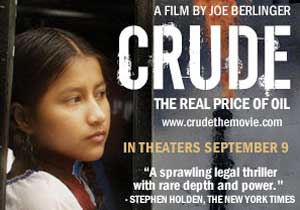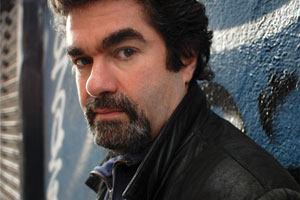
<a href="http://www.crudethemovie.com/press-room/">Crude: The Real Price of Oil.</a>
Darkness is never far from the surface of Joe Berlinger’s films. In his latest documentary, Crude, it takes the form of oil—billions of gallons of the stuff that have saturated a once pristine swath of the Amazon rainforest and fueled a 16-year legal battle between indigenous Ecuadorians and the oil giants Texaco and Chevron. The environmental theme is a departure for the 47-year-old director, who’s best known for in-depth looks at misfits, murder, and heavy metal. He made his name in 1992 with Brother’s Keeper (codirected with longtime collaborator Bruce Sinofsky), the tale of an elderly eccentric who may or may not have killed his brother. That was followed in 1996 by Paradise Lost, a harrowing film that turned the case of the West Memphis Three—a trio of Arkansas teens convicted of murdering three eight-year-old boys based on flimsy evidence of satanism—into a cause célèbre. That film and its sequel eventually led Berlinger to make Metallica: Some Kind of Monster, the 2004 rockumentary about a different kind of headbanging—group therapy for rock stars. Berlinger spoke with Mother Jones from his office in New York.
Mother Jones: What was more arduous: a couple of years in the rainforest, two years in the studio with Metallica, or following the West Memphis Three for the past 15 years?
Joe Berlinger: I would definitely say that this film was really the hardest thing I’ve ever been involved in. We were sometimes shooting in 120-degree heat. The area has just been devastated by oil production and pollution. You end up with a splitting headache because the fumes were so intense. I was advised by my doctor to take Malarone, which is an anti-malarial. On the third or fourth day I almost pulled my Martin Sheen Apocalypse Now moment because I felt like I was going psychotic.
We were also two miles from the Colombian border in a part of Colombia where FARC was very active and where drug runners were very active. The day I checked into my quote-unquote “hotel,” somebody had been gunned down in front of the entrance, so when I walked in to check in, I literally was walking through an active crime scene.
The other hard part was just the emotional toll. You’re dealing with people—young kids, 18-year-olds who are dying of cancer, people who just feel hopeless and devastated because there’s literally no clean water. So it was really not an easy film to make, on every level. But it’s probably the most fulfilling thing I’ve ever been involved in.
MJ: So how did you learn about this story?
JB: Steven Donziger, the American lawyer in the film. At first I was dubious. I said to him, “I am not an agitprop filmmaker. I’m a filmmaker who is known for these ambiguous portraits that tell multiple sides of the story without really telling the audience what to think. But knowing that, if you still want to take me down there, let’s check it out.” Then I went out to Lago Agrio, Ecuador, which literally means “sour lake.” It’s named after Sour Lake, Texas, which is the birthplace of Texaco. I felt like the universe was tapping me on the shoulder saying, “You’re the guy who has to tell this story because nobody else is.”
MJ: You give Chevron a lot of time in the movie, which really complicates the question of who’s legally to blame.
JB: My attitude is, I am not a lawyer; I am not a doctor; I am not a scientist. I am a filmmaker and I want to present what each side is saying and let the viewer come to their own conclusion.
Chevron has wrapped itself in some pretty good arguments that make you scratch your head. The moral responsibility is certainly at its door. I leave it to other people to figure out whether there’s legal responsibility.
To me the film is not about who should win the lawsuit; it’s a much larger issue. Unfortunately, because of the way corporations work, because of the way the legal system works, this is something that’s going to take decades to get resolved—and it may not even get resolved. Meanwhile these indigenous people are suffering. They can no longer sustain themselves; what kind of life are they going back to? In many ways this is more a human rights film than an environmental film.
MJ: What would you like to see come out of this film?
JB: I hope that the film sends the message out that you should be very aware of where your products come from and how companies act in your name. On a more direct level, I would love people to donate to the Ecuador Water Project [a UNICEF program founded by Trudie Styler, Sting’s wife]. The only tangible benefit that these people have received from all of this attention to this case is the fresh drinking water. It is a sad comment on our society that it takes the wife of a famous rock star to come winging into the Amazon to pressure UNICEF to get involved.
MJ: Have there been any updates to the case since you’ve finished the film?
JB: There’s a new judge, but Chevron has vowed to fight any verdict that comes out, and it’s promised a “lifetime of litigation.” So I think it’s going to go on forever. A decision will be rendered, they say, by the end of the year. But again, that just will kick the appeals phase in. Look at what’s going on in Paradise Lost. Poor Damien Echols [of the West Memphis Three] is spending his 16th year in a supermax prison. It’s just outrageous.
MJ: Are you working on another update to Paradise Lost?
JB: In theory. But there hasn’t been a lot to film because we’re not allowed in the courtroom—we were thrown out a long time ago. We’re committed to telling the end of the story. Paradise Lost has created this huge movement and a lot of celebrities from Eddie Vedder to Johnny Depp have gotten involved in the case. And Metallica. I think because of that support, the state of Arkansas will never actually take the step of executing Damien. So I think we’ve achieved that, but they are doing everything possible to slow the case down to the point of absurdity. The case is moving glacially slow and we’re committed to telling the end of the story. But unfortunately the end of that story, whether it’s execution or exoneration—it doesn’t seem like either of those things are happening any time soon.
MJ: Do you have any theories on who is the real murderer?
JB: I’d rather not get into my theories. My personal belief is that the kids are definitely innocent. There is just an abundance of reasonable doubt.
MJ: In many of your films you use clips of local news coverage. There’s always a contrast between the reporter on deadline and you guys, who take a couple of years to look at the story. Is that something that you try to play up, or is it just a convenient way of advancing the narrative?
JB: It’s both. Since we lock ourselves into a nonnarrated form, it’s really useful to move the story along without having to rely on narration. In many ways it is narration but it just doesn’t feel that way. But it goes much deeper than that. One of my obsessions is how the media reports things, how we consume media—this is a thing that has driven me as a storyteller. Life is much more complex than the black-and-white sound bites that you get on television. There are nuances and shades of gray. In Crude, in particular, one of the things that we’re focusing on is how each side tries to control the message. It will make your head spin as to how Chevron portrays things versus how the plaintiffs portray things. I think both sides are a little over the top, and a little blinded by their points of view. I think that the story is much more complex than either side is saying.
Interestingly, this case gets zero traction until the media gets involved. Vanity Fair does a profile [of the plaintiffs and their lawyer, Pablo Fajardo] that brings Trudie Styler down. Trudie Styler then brings a larger media contingent and she uses the platform of Live Earth to introduce Pablo to a larger international stage, which leads directly to a CNN Hero award.
MJ: It seems like you have a lot in common with Errol Morris, who seems to subscribe to a similar philosophy of breaking a story into its various parts so you can’t necessarily put it back together into a single whole.
JB: I think philosophically we are similar. But I would say stylistically we’re worlds apart. He relies on certain contrivances that I don’t like. I hate the Interrotron. By using the Interrotron, the subject is looking directly at the viewer, but I think that is almost dishonest, because the reality is that subject is actually looking at Errol Morris. I’d rather have my interview subject looking slightly off-camera to acknowledge that there is a relationship between the filmmaker and the subject. I never believe I’m presenting objective reality; I also don’t want to delude people into thinking that my subject is talking directly to them. They’re talking to me. And I’m an imperfect human being who’s making a million subjective decisions to present you with this picture.
MJ: Damien Echols says that Metallica’s “Welcome Home (Sanitarium)” is his favorite song. Did that make the connection with the band that led to Some Kind of Monster?
JB: One of the great ironies of my career is that people imagine me as some sort of hardcore metal guy because of the Metallica film. But the reason we met Metallica was that their lyrics were introduced into the trial. At the time I barely knew who Metallica were. All I knew is that their music was on trial as well as Damien, and it’s absurd in this country that your musical taste will define for a prosecutor that you must be a killer. So I reached out to Metallica. We ended up really hitting it off. They gave us the music for nothing. It led to a relationship, which led to the film.
MJ: Did you get some benefit from the group therapy Metallica went through?
JB: I actually did. After Paradise Lost 2 I went and did the disaster of my career, the sequel to the Blair Witch Project. It was not a small disaster; it was on a worldwide belly-flop level. The studio recut it and it bore zero resemblance to the film that I thought we were making. It just put me into a profound depression because it was a total disaster. So I called [Metallica drummer] Lars Ulrich up and said, “You wanna make that film now?” I went out to San Francisco, started shooting, and within a week, the band was falling apart. Lars looked at me and said, “You know, I’m not sure, they’re bringing in this performance enhancement coach.” I said, “Lars, that’s the film.” I felt so grateful to be sitting there and listening to this because I felt like, “Look, here are incredibly successful people who are going through their own creative and existential crisis, just like me.” I didn’t know what my next move was, I felt like I fucked up my career, I was turning 40, just like these guys were. It just was this incredibly uplifting, inspiring experience to witness these guys going through it at a time when I really needed to hear some of that stuff.
So the Metallica film was like this incredible life experience where I learned the most through guys that stereotypically you would think couldn’t offer much to you. That’s what I love about the film: It explodes your stereotype of them—they’re not just a bunch of lugheads banging on the guitar.
















